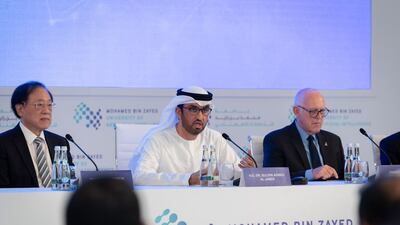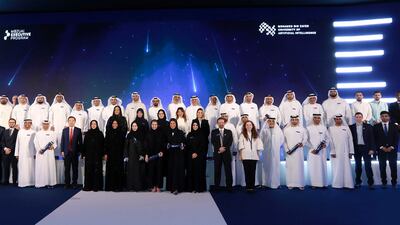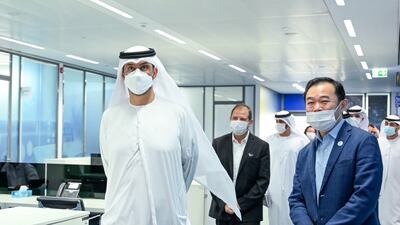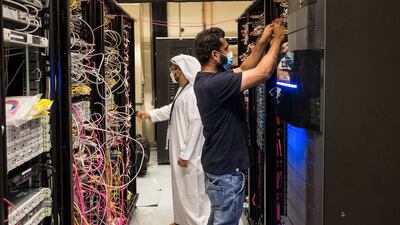It is estimated that artificial intelligence will add nearly $16 trillion to the global economy by 2030, according to the World Economic Forum. The UAE, which already plays a significant role in AI adoption, is well placed to tap into this opportunity. The technology is expected to contribute up to 14 per cent to the country’s gross domestic product — equivalent to $97.9bn — by 2030, according to consultancy PricewaterhouseCoopers.
Mohamed bin Zayed University of Artificial Intelligence — a university dedicated solely to AI — is set to play a vital role in adding impetus to this growth. The institution is contributing to the UAE’s national strategy for AI, which is designed to position the country as a leader in this category by 2031.
Dr Sultan Al Jaber, Minister of Industry and Advanced Technology, and chairman of MBZUAI's Board of Trustees, touches upon how the university, the UAE's industry, innovation in the energy sector and sustainability agenda are poised to shape the country’s future, while making it the global leader in innovation.
He highlights the vision of President Sheikh Mohamed, which prioritises strengthening people’s capabilities in science and technology, to benefit all economic areas and society as a whole.
Q&A:
Why is a university entirely dedicated to AI important to have?
In 2017, the UAE set out an ambitious National Strategy for Artificial Intelligence. This strategy details the country’s goals to become one of the leading nations in AI by 2031 in alignment with the UAE Centennial 2071. MBZUAI will play an important role in realising that vision by helping to create new economic, educational and social opportunities for citizens, government entities and businesses in an ecosystem where innovation thrives.
Today, more governments and companies are using artificial intelligence in their digital transformation to make their operations smoother, faster and more efficient. Digitisation is critical to the success of AI implementation, with both building on the other to deliver unique insights, through the algorithmic analysis of digital data sets, enabling new capabilities and services such as forecasting trends, or identifying efficiency improvements.
I believe that AI is one of the most important economic and social game changers of our era and is expected to make organisations leaner, more efficient, more profitable, more agile, and more capable of surviving market shocks, changes and fluctuations.
To best capitalise on the advantage presented by AI, we need highly qualified professionals in AI disciplines such as computer vision, machine learning, natural language processing, and robotics — and competition for talent with these skills is high, globally.

We heard in the address from His Highness Sheikh Mohamed bin Zayed Al Nahyan, President of the UAE, that we must strengthen people’s capabilities in science and technology, to benefit all economic areas and society as a whole. In line with this vision about the importance of nurturing these skill sets in the UAE and beyond, MBZUAI has set ambitious targets.
The university will deliver critical contributions to research and education, and act as a thought leader to help the UAE anticipate and take advantage of the new technologies now and in the future. Thus far, the university has attracted a top research faculty, 58 per cent of whom hail from the world’s top 100 AI institutions. These talented faculty members are focusing on shaping the next generation of talent from the UAE and across the globe, to realise their full potential as leaders in AI.
Currently, the University has 133 students enrolled from 37 nationalities, reflecting the cosmopolitan diversity of the UAE. The university’s first cohort of students will graduate this coming December.
In addition to the necessity of top faculty and students though, there is also a real need to foster innovation. The university acts, not only as a talent developer, but also as an innovation hub and think tank for the nation in AI. When we look at global examples, we see that vibrant business communities come from large national investments in people, businesses and in the kinds of research that is the basis for innovation and entrepreneurship. Universities foster all these things, so a graduate AI research university was the ideal fit.
In which sectors do you believe AI can add the most value?
The UAE is focused on leveraging physical and digital AI assets across two primary areas: industry assets and emerging sectors, as well as smart government.
In the first sector, there are major AI opportunities that can add value across several sectors — resources and energy, logistics and transport, tourism and hospitality, health care, and cybersecurity. In the energy sector, for example, we are embedding advanced technologies across our entire value chain to maximise asset efficiency and enhance performance. In the oil and gas sector, Adnoc AI-enabled platform Thamama has already generated $1.1bn in business value since its inception in 2017 by leveraging advanced technology, digitalisation, and AI.
In fact, Adnoc is leading the industry in deploying cutting-edge technologies, including AI, big data, blockchain and digitalisation.
Our state-of-the-art Panorama Digital Command Centre is one of the largest predictive platforms in the world. The world-leading facility aggregates real-time information across Adnoc’s Group companies, using smart analytics, to display 250,000 real-time data points from all operational sites, providing employees with a complete integration of data between onshore and offshore facilities. Since its inception in 2017, Panorama has generated more than $1bn in business value.
Adnoc has also created AIQ in a joint venture partnership with G42, to develop AI-enabled technologies to optimise value chains, assist predictive maintenance, and implement blockchain-based hydrocarbon accounting.
By prioritising productivity, predictability and greater protection for people and the environment, AI is changing how we do business on a daily basis.
In line with the vision of our leadership that prioritises skills and talent development, MBZUAI is proud to encourage and support experiential learning through the provision of internships for diverse talents studying within the UAE and abroad. Through practical application and skills development, we provide our interns with valuable learning and career development opportunities.
Moreover, AI is already being applied in nationally significant initiatives such as the Emirati Genome Program, which uses AI-based tools to extract and interpret large amounts of complex data resulting from DNA sequencing.
In the smart government domain, the UAE public sector is already a leader in smart public service delivery and is taking steps to apply AI in innovative ways across government. This includes dynamically adjusting transport timetables to respond to incidents, using AI sensors for smart traffic, deploying facial recognition to monitor driver fatigue, and introducing chatbots to improve customer service.

Can you give concrete examples of how the university has made a difference?
Thus far, MBZUAI has established a number of partnerships for AI research and development with organisations like the Abu Dhabi Digital Authority, the Technology Innovation Institute, the Weizmann Institute of Science and more.
The university recently developed a partnership with tech major IBM to host a Centre of Excellence for AI research and development. The centre will bring students and faculty together with IBM researchers to develop natural language processing tools in Arabic, as well as AI applications that address challenges in climate and health care.
In health care in particular, MBZUAI has joined forces with the Abu Dhabi Health Services Company, Seha, to save lives through the development of algorithms that predict heart attacks.
And MBZUAI students are working to improve the diagnosis and treatment of cancer as well as screening for autism spectrum disorders in children. Students are also using AI to design safety solutions for the transport sector — several students were recognised by the Dubai Roads and Transport Authority, for example.
So, it happens at all levels. MBZUAI is helping government partners implement AI, attracting global partnerships and expertise, and working to develop the kinds of talented workers we will need for decades to come. Truly, this university is an open invitation to the world to collaborate on AI, and to put the power of technology to work to increase prosperity, and to make people’s lives better.
How is the success of a graduate university measured?
In addition to doing great research, success can be exemplified in the calibre of talent we are attracting. In just a short, two-year time span since the university was founded, MBZUAI has been ranked 127th globally among institutions that conduct research in computer science including AI, systems, theory and "interdisciplinary" areas such as robotics, computer graphics, visualisation and more. The ranking places MBZUAI alongside institutions such as Notre Dame, the University of Liverpool, the Weizmann Institute of Science, Osaka University and other prestigious schools.
In the areas that MBZUAI currently focuses on — artificial intelligence, computer vision, machine learning, and natural language processing — MBZUAI ranks 30th globally ahead of several renowned research universities worldwide such as the University of Michigan, Georgia Tech, and the University of Toronto in North America; Imperial College London, EPFL, Max Planck Society in Europe; and the University of Tokyo, Seoul National University and the University of Sydney in Asia Pacific. MBZUAI is now the top-ranked CS institution in the Arab world, and in the Middle East and Africa.
How do you ensure that you don’t encounter resistance to change from all market players?
Ultimately, we aim to support private and public sector actors in realigning their priorities. We work with them to highlight the advantages and the benefits that this change will drive in tech, in automation and in forecasting.
One of the ways we are approaching this is by arming private and public sector leaders, decision makers and strategists with a deeper understanding of how AI technologies can foster future success. MBZUAI is offering high-level training through its Executive Programme that brings leaders together and starts a dialogue between sector leaders looking to increase their competitiveness with AI technologies, with automation, with robotics and more.
It is also important to note that the UAE is already globally competitive in a number of key areas. When it comes to the proportion of university graduates who study Stem subjects, for example, this is one metric in which we compare favourably to the US — 22 per cent in the UAE compared to 16 per cent in the US.
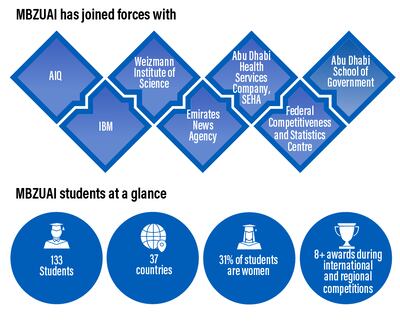
Our young UAE graduates already have the foundational skills relevant to AI such as computer science, programming literacy and statistical analysis, and so can be rapidly upskilled to become AI-ready. Emiratis already make up 13 per cent of students at MBZUAI, and there are further opportunities to develop the pipeline of UAE talent at the university.
The university collaborates with various industrial partners to ensure students have internship opportunities while they are studying and to secure employment to keep them in the country following graduation. This is a big opportunity to tap into top pools of global talent — these are bright young people that will create start-ups, that will lead some of our institutions, and they will help create the right environment for home-grown talent to thrive as well.
You’ve made a strong case for talent development and innovation, but how does fundamental research benefit the country?
I think fundamental research is a more long-term investment. In line with the vision of our leadership, we are working towards reinforcing the R&D culture. Our AI strategy is aimed at 2031; our national plans are mainly focused on 2050. And our Centennial Project is looking to 2071. So, we are accustomed to planning for the long term.
Fundamental research is a way for us to lead and excel, now and in the future, especially in the kinds of sectors that are important for the UAE, such as developing our youth, fostering entrepreneurship and sustainability.
Fundamental research is about the Research Methodology Paths — it supports our young people to solve big problems, to do it in a data-driven way, and to do it collaboratively.
There is a famous saying that the best time to plant a tree was yesterday. We have a legacy of doing just that as a nation, and that’s why we are confident in making long-term investments like the one we’ve made in forming MBZUAI.
We need to make great efforts in the foundational and early stages, and I am confident that MBZUAI will be in an excellent position globally within the next 20 or 30 years. And I think the world is already beginning to sit up and take notice.
What is the key to success for UAE industry in the decades to come?
Thanks to the vision of our leadership, we have a robust plan for how UAE industry can lead and an important element of that is artificial intelligence.
AI is expected to add nearly $16 trillion in value to the global economy. The UAE made AI a strategic national priority with the National Strategy for Artificial Intelligence 2031 and the appointment of the world’s first Minister of State for AI. The very existence of the Ministry of Industry and Advanced Technology, which oversees expanding the effect that advanced technologies, AI included, have on industrial growth, resilience, and the competitiveness of the national products, is a testament to the current climate and priorities here.
As we have seen in the UAE, success is about setting out a bold and ambitious strategic vision and then really achieving that through doubling our efforts, investments and our initiatives.
MBZUAI is one such investment that aims to contribute significantly to the knowledge and support the industrial sector’s growth, that will cultivate a generation of AI experts for the local market, spur the growth of a start-up ecosystem, and attract global innovators to base their operations in the country.
HH Sheikh Mohamed bin Zayed Al Nahyan, the President of the UAE, said it best during the university’s founding: MBZUAI “echoes the UAE’s pioneering spirit and paves the way towards a new era of innovation and technological advancement that will benefit the UAE and the world”.
